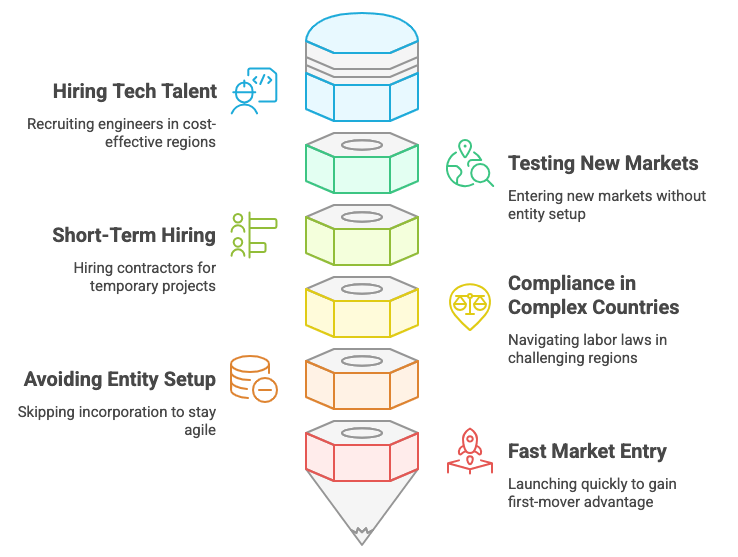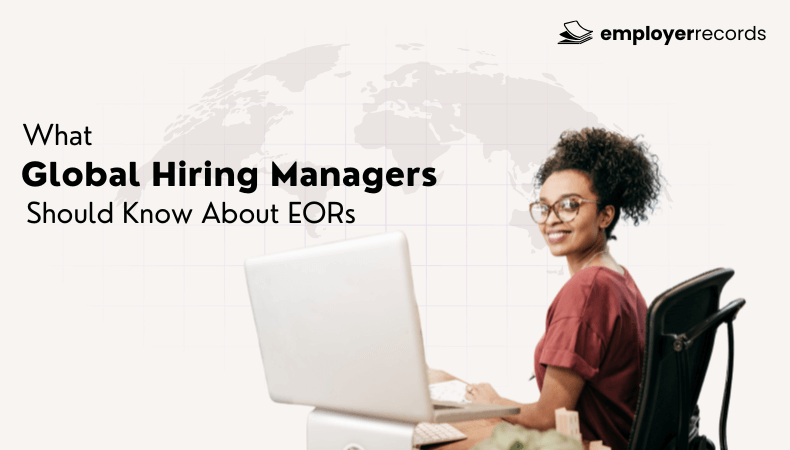Hiring across borders without legal headaches is driving startups and SMEs to adopt EOR services at unprecedented rates. EORs enable companies with lean HR teams and tight budgets to onboard international talent in as little as one to two weeks, bypassing the months-long entity setup process.
By handling payroll, tax withholding, and benefits administration in foreign jurisdictions, EORs shield growing businesses from complex compliance risks and potential fines.
Startups can leverage EORs to pilot new markets such as Germany or Brazil, without the upfront investment to form a local legal entity, ensuring true agility.
SMEs expanding into multiple regions often tap EOR platforms to establish sales or customer-success teams abroad, slashing administrative costs by up to 70% compared to traditional entity formation.
Seed-stage SaaS companies have used EORs to hire engineers in Eastern Europe and launch MVPs within 60 days, rather than waiting six to nine months.
Additionally, EORs offer flexibility for short-term projects or interim hires, like maternity leave coverage, without long-term contractual commitments.
In this article, we’ll explore the top EOR use cases for startups and SMEs, showing how this model drives faster global hiring, ensures compliance, and reduces operational burdens.
Key Takeaways
- Focus on Core Operations: Shift resources from HR admin to product, sales, and growth priorities.
- Faster Hiring: EORs enable startups and SMEs to onboard global talent in just 1–2 weeks, bypassing months-long entity setup.
- Lower Costs: Avoid high legal and administrative expenses, save up to 70% compared to traditional expansion.
- Compliance Made Easy: EORs handle local labor laws, taxes, and benefits, reducing risk of fines or penalties.
- Global Talent Access: Tap into skilled professionals across LATAM, Eastern Europe, and Southeast Asia without borders.
- Flexible Hiring: Ideal for short-term projects, pilots, or temporary roles without long-term commitments.
What Is An EOR?
In today’s globalized economy, an Employer of Record (EOR) enables companies to expand internationally without the complexity of setting up foreign entities.
An EOR is a third-party organization that legally serves as the employer for your workforce, assuming all employment-related obligations, including payroll, tax withholding, benefits administration, and compliance with local labor regulations.
The hiring company retains managerial control over employees’ daily work, while the EOR manages contracts, onboarding, and statutory reporting, enabling hires in days rather than months.
By outsourcing these tasks, startups and SMEs can mitigate risk, reduce entity formation costs, and accelerate talent acquisition.
Why Startups And SMEs Use EORs
Below is a detailed look at why startups and SMEs increasingly turn to employer-of-record (EOR) services to power their global growth.
Key Takeaways:
Startups and SMEs use EORs primarily to save time and costs, ensure full compliance, access global talent quickly, maintain operational flexibility, and focus on core business functions.
Cost & Time Efficiency
Significant cost savings come from bypassing the high legal and administrative expenses of entity setup, often ranging from tens to hundreds of thousands of dollars, by leveraging an EOR’s existing infrastructure.
Rapid market entry is possible in days or weeks rather than the typical 3–9 months it takes to register local entities, thanks to the EOR’s established hiring processes and local expertise.
Compliance & Risk Mitigation
EORs assume full responsibility for local labor law compliance, including payroll taxes, statutory benefits, and mandatory filings, shielding businesses from fines, audits, and legal liabilities.
By offering expert local guidance, EOR providers help companies navigate complex regulations such as minimum wage rules, termination procedures, and worker classification, minimizing costly mistakes.
Access To Global Talent
Partnering with an EOR unlocks a worldwide talent pool, enabling startups to hire specialized skills in regions like Eastern Europe, Latin America, or Southeast Asia without entity formation hurdles.
EOR platforms also streamline global payroll management, handling multi-currency payments and tax withholdings across jurisdictions so teams get paid accurately and on time.
Operational Flexibility
EORs act as a single point of contact for all employment-related queries like contracts, equipment issuance, and visa support, simplifying HR administration for lean teams.
They enable businesses to scale up or down rapidly, whether hiring contractors for short-term projects or covering leave gaps, without long-term commitments to a foreign legal entity.
Focus on Core Business
By outsourcing payroll, benefits, and compliance, startups and SMEs can redirect limited resources toward product development, sales, and customer success—areas critical for growth.
This reduction in HR overhead frees leadership to prioritize strategic initiatives, rather than getting bogged down in administrative tasks.
Global EOR Strategies for Startups and SMEs

Top EOR Use Cases For Startups
Startups thrive on speed and agility, but global hiring can slow them down. EORs remove those barriers.
Employer of Record (EOR) services offer a strategic solution, enabling startups to onboard international talent swiftly without the need to establish local entities.
Below, we explore the top EOR use cases tailored for startups, illustrating how this model supports global expansion, ensures compliance, and accelerates growth.
Hiring Global Tech Talent Without A Local Entity
Startups often need to find the best talent fast, especially in development or design. If the right engineer is in Argentina or Vietnam, an EOR can legally employ them instantly, without waiting 6–9 months to register a business there.
Example: A seed-stage SaaS startup uses an EOR to hire two engineers in Eastern Europe, helping them launch their MVP within 60 days.
Testing New Markets Without Commitment
EORs allow startups to pilot a new region without committing to incorporation. You can onboard sales or support staff in key markets like Germany or Brazil to test traction before investing heavily.
Handling Compliance In Complex Jurisdictions
Startups often overlook compliance requirements, such as minimum notice periods or local holidays. EORs shield startups from penalties by handling these risks upfront.
Top EOR Use Cases For SMEs
For small and medium-sized enterprises (SMEs), expanding into new markets or hiring international talent often involves navigating complex legal and administrative challenges.
Employer of Record (EOR) services offer a streamlined solution, enabling SMEs to onboard employees globally without the need to establish local entities.
By leveraging EORs, SMEs can mitigate compliance risks, reduce operational costs, and accelerate their global growth strategies. Below, we explore specific scenarios where EOR services provide significant advantages for SMEs.
Scaling Into New Regions Rapidly
SMEs looking to expand their footprint can hire sales or customer success teams abroad using an EOR. This reduces friction and gives them a first-mover advantage in competitive markets.
Example: A 100-person edtech company expands to LATAM by hiring five regional reps through an EOR platform, avoiding the $100K cost of entity setup.
Supporting M&A Or Team Transfers
During a merger or acquisition, EORs provide temporary employment continuity for acquired talent, especially in countries where the acquirer lacks a legal presence.
Backfilling Roles Or Temporary Projects
For SMEs with short-term needs (e.g. covering maternity leave or running a local campaign), EORs allow compliant hiring without long-term legal ties.
Industry Insights
In the evolving landscape of global employment, Employer of Record (EOR) services have emerged as a pivotal solution for startups and small to mid-sized enterprises (SMEs) aiming to expand their international footprint efficiently.
The 2024 Everest Group’s Employer of Record (EOR) Solutions PEAK Matrix® Assessment highlights the increasing reliance on EORs, emphasizing their role in facilitating rapid and compliant global hiring strategies.
A significant trend observed is the strategic hiring by startups in the U.S. and U.K. through EORs in countries like India, Mexico, and the Philippines.
This approach grants access to a vast pool of affordable, skilled labor and ensures swift onboarding processes, crucial for maintaining a competitive advantage in fast-paced markets.
The utilization of EORs in these regions not only streamlines administrative complexities but also mitigates risks associated with local labor laws and compliance requirements.
These insights underscore the growing importance of EOR services as a strategic tool for startups and SMEs seeking agile and compliant global expansion.
EOR vs Traditional Expansion
When considering international expansion, startups and SMEs often face the dilemma of choosing between establishing a local entity or partnering with an Employer of Record (EOR).
Each approach offers distinct advantages and challenges, particularly concerning cost, compliance, and scalability.
The following table provides a side-by-side comparison of EOR and traditional expansion methods to help you determine the best fit for your business needs.
EOR vs. Traditional Entity Setup: Key Differences
| Feature | Employer of Record (EOR) | Traditional Entity Setup |
|---|---|---|
| Time to Hire | 1–2 weeks | 3–9 months |
| Upfront Costs | Low (monthly subscription or fee) | High legal, accounting, and setup costs |
| Compliance Management | Handled by EOR | Managed internally |
| Legal Entity Required | No | Yes |
| HR & Payroll Support | Fully managed | Needs to be built from scratch |
| Best For | Startups, SMEs, project-based hiring | Large-scale, permanent operations |
| Scalability | High — scale up/down easily | High—scale up/down easily |
| Risk Exposure | Lower — EOR assumes legal liabilities | Higher — direct legal obligations |
| Market Testing | Easy to test markets without setup | Slower, more rigid structure |
Common Myths About EORs
Despite the growing adoption of employer-of-record (EOR) services, several misconceptions persist, deterring some startups and SMEs from leveraging this model. These myths often stem from misunderstandings about control, cost, and compliance.
Let’s debunk the most common myths about EORs:
- “EORs are only for big companies.”
In reality, EORs are tailor-made for lean startups and growth-stage SMEs. - “You lose control over your team.”
You manage your employees’ work. The EOR only handles legal employment functions. - “EORs are too expensive.”
Compared to the cost of local entity formation, EORs are often 5–10x more cost-effective.
Is EOR Right For Your Business?
If you’re considering whether an Employer of Record (EOR) is the right fit for your startup or SME, here are key indicators to guide your decision:
- You need to hire internationally without establishing a local entity.
- Rapid global hiring is essential to your growth strategy.
- Navigating complex local labor laws poses a challenge.
- You aim to minimize administrative overhead and focus on core operations.
- Flexibility in scaling your workforce up or down is a priority.
- Ensuring compliance with diverse tax and employment regulations is critical.
- You seek to onboard talent quickly to capitalize on market opportunities.
- Managing multi-country payroll and benefits internally is resource-intensive.
- You prefer to test new markets before committing to permanent expansion.
- Avoiding the high costs and time associated with entity setup is important.
By evaluating these factors, you can determine if partnering with an EOR aligns with your business objectives and operational needs.
Conclusion
For startups and SMEs aiming to scale globally, Employer of Record (EOR) services offer a strategic advantage. By handling complex tasks such as payroll, tax compliance, and benefits administration, EORs enable businesses to focus on core operations without the burden of establishing legal entities in each country.
This approach not only accelerates market entry but also ensures adherence to local labor laws, reducing the risk of non-compliance. Moreover, EORs provide the flexibility to scale the workforce up or down as needed, which is crucial for businesses navigating dynamic markets.
By leveraging EOR services, companies can efficiently tap into global talent pools, streamline international operations, and drive sustainable growth.







